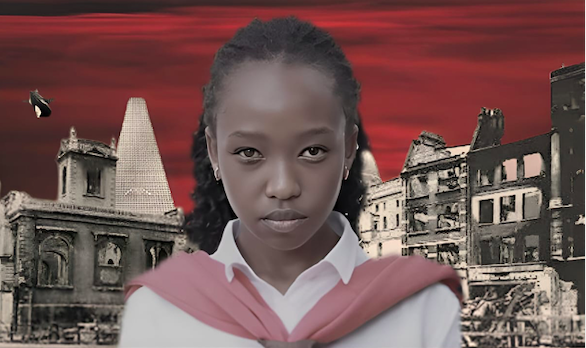The much anticipated performance of the play 1984, presented by Under Debate, opens at Braeburn Theatre this week on 13 June.
In advance of the show, we caught up with actor / director / producer Daniel Hird, who produces and plays lead Winston Smith, and the show’s director Lee Crew, who most recently directed the very successful Shrekk the Musical. They provided insights to their motivation and the creative process of producing and directing 1984.
First brought to Kenya last year by Hird and performed with Braeburn School, 1984 is now opening to a general audience, with a cast drawn from the renowned Braeburn Players and KADS, as well as independent Kenyan actors.

O’Brien played by Adrian Massie-Blomfield
The play 1984 is based on the novel of the same name by George Orwell, published in 1946. With the rise of communism and fascism in various parts of Europe, Orwell wanted to impress a message of the threat of totalitarianism and mass surveillance on his audience. The novel was set in the “future”, which was believed by the mentally manipulated characters to be 1984.
More broadly, the story examines the role of truth and facts within societies and the ways in which they can be manipulated. The fictional country, Oceania, is governed by the all-controlling Party, which has brainwashed the population into unthinking obedience to its leader, Big Brother. The population is continually surveilled by Telescreens and by each other, watching out for slips of disobedience and Thoughtcrimes. A new language is created, called Newspeak, which eliminates words which would allow any questioning of the regime, or dialogue of politics.
Picture a boot stamping on a human face, forever…
The lead protagonist, mid-level Party man Winston Smith, struggles internally with the oppression. Defying a ban on individuality, Winston dares to express his thoughts in a diary and to internally question the party, while living in a state of paranoia.

Julia played by Rotam Yaniv-Cohen
Winston also has a forbidden relationship with a woman called Julia. Together they join an anti-party relationship and the plot is propelled by the question of whether they can maintain their relationship and win over the Party.
Hird talked about his perception of the character:
“Winston Smith is a profoundly tragic figure. He embodies the human spirit’s yearning for freedom and truth in a world where such desires are systematically crushed. To me, Winston represents the everyman caught in the gears of a merciless, dehumanizing system. His quiet rebellion, his desperate search for authenticity in a sea of lies, is both inspiring and heart-wrenching.”

Winston Smith played by Daniel Hird
Having become a classic of dystopian literature, 1984 was adapted as a play by Robert Icke and Duncan Macmillan in the UK in 2013. The play retains the themes and main plot lines Orwell’s novel and delves into the mechanisms of mind control and the erosion of personal integrity under torture and ideological subjugation.
Hird told us that he was motivated to bring 1984 to Kenya by several compelling factors. Firstly,
The themes of surveillance, authoritarianism and the manipulation of truth, are highly relevant in today’s global political climate
This includes “Fake News”, government transparency and civil liberties. Additionally, putting on this production allows local audiences to experience this classic piece of Western literature and theatre, promoting cross-cultural understanding and dialogue.

Martin played by Henriques Katema
Hird added that for local actors, directors and production teams, 1984 is a challenging and exciting play to stage. The play’s complex characters, intense narrative and variety of theatrical techniques require a high level of skill and creativity, which creates a brilliant opportunity to showcase local talent.
As well as producing, Hird stars as Winston Smith. We discussed how this portrayal feels to him, as an actor:
“Portraying Winston allows me to explore the depths of human resilience and fragility. I admire his courage, however futile, to seek the truth and connect with his own humanity despite overwhelming odds. Yet, there is an inevitable sense of doom that accompanies his journey, a stark reminder of the devastating power of oppressive regimes. Through Winston, I confront the uncomfortable reality of how easily freedom can be eroded and the immense cost of reclaiming it.
In essence, becoming Winston Smith is an act of emotional and psychological excavation. It challenges me to tap into profound layers of vulnerability and resistance, making it one of the most demanding and rewarding roles I have ever undertaken.”

The play employs Brechtian techniques and staging, such as multi-roling (when an actor plays multiple characters), minimal set and props, and keeping the audience as active members of the theatrical experience by keeping them thinking throughout, not switching off.
Crew was thrilled to be invited to direct this production as 1984 is one of her personal all time favourite books. She was also very taken with the Brechtian staging of the show and keen to get dug into that aspect. In keeping with the Brechtian staging, the audience needs to be challenged, while keeping the production simple, with minimal set changes. On the other hand, Crew felt it was very important to ensure that the play captures the spirit of the novel.
“I love the modernist approach and the dual-charactering of people, and we’re really leaning into that…but what we’re really trying to do clearly is to tell the story”
As the novel is not a set text for students here in Kenya (as it is in the UK), Crew had a remit to make the story accessible yet impactful for a modern Kenyan audience, who couldn’t be assumed to be familiar with the story. Lee told us that she needed to prioritize conveying the story’s themes and messages, including those of surveillance and control.

Lee directing rehearsals. Photo courtesy of Under Debate.
This unique staging is set in the dystopian future (2084) of a world that is the same as ours, but where the text 1984 is a historical document, not a novel. The physical setting is a museum dedicated to the text. The exhibit is the story of the historical document 1984. The line between the 2084 world of the museum and the historical past is at first clear cut, but becomes more blurred. Blurring the lines between past, present, and future, creates a disorienting effect that mirrors the novel’s themes of manipulated reality. If you feel disoriented by the plot, then the cast will be doing it right.
1984 plays at Braeburn Theatre, Gitanga Rd. 13th, 15th & 16th June
Suitable for ages 13+ due to mature themes
Tickets on https://theatres.braeburn.com/events-1


